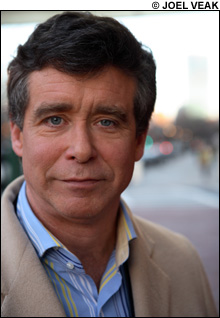 The events of September 11, 2001, are responsible for a depressing amount of bad art and inane commentary. grossly premature grandiose pronouncements, like Graydon Carter’s infamous “end of irony” article in Vanity Fair. (“There’s going to be a seismic change . . . . Things that were considered fringe and frivolous are going to disappear.”) Glib, provocative novels like Frédéric Beigbeder’s Window on the World. (“They suffered for 102 minutes, the average running time of a Hollywood film.”) Pat rock songs like Sleater-Kinney’s ham-fisted “Far Away.” (“The president hides/ while working men rush in/ to give their lives.”) Jingoistic ditties like Paul McCartney’s execrable “Freedom.” (“We talkin’ ’bout freedom. I will fight, for the right to live in freedom.”)
The events of September 11, 2001, are responsible for a depressing amount of bad art and inane commentary. grossly premature grandiose pronouncements, like Graydon Carter’s infamous “end of irony” article in Vanity Fair. (“There’s going to be a seismic change . . . . Things that were considered fringe and frivolous are going to disappear.”) Glib, provocative novels like Frédéric Beigbeder’s Window on the World. (“They suffered for 102 minutes, the average running time of a Hollywood film.”) Pat rock songs like Sleater-Kinney’s ham-fisted “Far Away.” (“The president hides/ while working men rush in/ to give their lives.”) Jingoistic ditties like Paul McCartney’s execrable “Freedom.” (“We talkin’ ’bout freedom. I will fight, for the right to live in freedom.”)
Even the novels that tried in earnest to deal with the subtler emotional subcurrents stirred by the attacks, like Jonathan Safran Foer’s Extremely Loud and Incredibly Close, were problematic, and drew more than a few slings and arrows (“a writer of talent who exploits holocaust to mythicize the most aggressive self-pity in modern American history,” carped The Nation).
So it’s entirely understandable that Jay McInerney faced writing a 9/11 book with trepidation. “For a long time I wasn’t sure how you could approach that subject,” he says, sitting in his room at the Hotel Commonwealth on a recent Monday afternoon, in town to read from his seventh novel, The Good Life (Knopf).
But several months after witnessing the attacks from his own window, after volunteering at Ground Zero, and after seeing the city he’d lived in and loved since the late ’70s change in a profound if fleeting way, McInerney made the decision. For a novelist in New York City — a novelist who’d made his career writing about New York City and its residents — dealing somehow with September 11 was “not only a right, but practically a duty,” he says. “If I was going to write about contemporary New York and not mention 9/11, I was going to have to do some very serious elision. But it was daunting. The danger of putting 9/11 in a book, of course, is that it will overwhelm the fictional universe you’re trying to create.”
McInerney’s wariness is precisely why The Good Life is so successful. The book is less about 9/11 as an event — the day itself is omitted completely — than about the aftermath, those few tragic yet strangely magical months when everything was different, and it seemed like it could stay that way. Charting that day’s reverberations in the lives and loves of the well-educated, well-heeled New Yorkers who are his stock-in-trade, McInerney masterfully evokes a scarred and damaged city, its citizens grappling with the new lives that might be possible. Honest, perceptive, and keenly felt, The Good Life — the story of two couples’ furtive, hesitant stabs at happiness in the brave and fearful new world of post-9/11 New York — is McInerney’s most mature and affecting book yet.
Jay McInerney, of course, has been chronicling New York life for two decades. His debut, Bright Lights Big City (1984), was a seminal study of Gotham’s intoxicating spell on a young new arrival, a manic second-person look at those glitzy, moneyed days of conspicuous consumption, stretch limos, and cocaine galore. Story of My Life (1989) was more of the same. Model Behavior (1998) ran amok in Giuliani-era Manhattan, skewering media swells, fashionistas, celebrity obsessives, and haughty litterateurs.
In a very real way, the city itself — fast, rich, toweringly arrogant but also vulnerable — is McInerney’s greatest character. How could he notprocess such an epochal chapter in its history? “I sort of felt, as someone who writes in New York, I had to engage it somehow,” he says. “I’ve been writing about my times in the city for 20 years. It was something I had to, in some way, register.”
William Faulkner was synonymous with Mississippi. For James Joyce, even as a self-made exile, Dublin was the world. And for McInerney — while hardly canonical — New York City is all. (Okay, the Hamptons too.) And just as Joyce boasted that were Dublin ever destroyed it could be rebuilt entirely from the pages of Ulysses, so does McInerney feel that “my job is to chronicle the contemporary city. You could draw a fairly comprehensive map of New York from my books.”
Even with his Boston roots (his grandparents were from Southie, his father from Wellesley, his mother from Newton), McInerney is a New Yorker first and foremost. “Most writers have their turf, the landscapes to which their imaginations respond,” he says. “New York is the ultimate urban environment. It’s still exciting to me. It’s still an amazing place, as much as it’s changed in the last 20 years.”